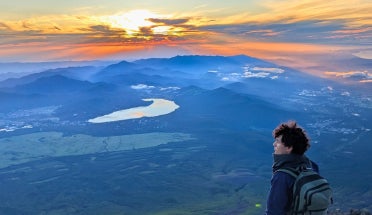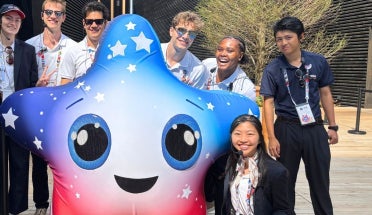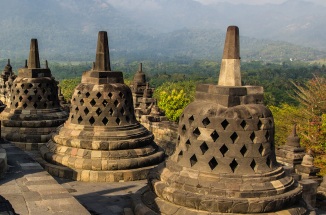
Moody Professor Shares Continuing Passion for International Education
- Nov 16, 2023
- Education Abroad
- by Alex Briseño
Dr. Stacey Sowards, a professor in the Moody College of Communication, grew up in a coal mining town in rural Colorado, but Indonesia has become her second home. The collaborations and education abroad trips she has experienced in the country as a student and a professor now span more than 25 years.
The daughter of an environmental manager at a coal mining company, Sowards also worked at the coal mining company for two summers after her first and second years of college. But by her junior year, Sowards’ dad accepted a position at a coal mining operation in East Kalimantan, Indonesia. Sowards had previously studied abroad in Mexico as an undergraduate student but had never traveled to Indonesia.
“Indonesia is the largest Muslim country in the world. Just learning about Islam and thinking about how it’s practiced in Indonesia was really revelatory to me in understanding the country’s religion, culture and linguistics,” Sowards said. “That time was super eye-opening for me, and that’s when I really started thinking about what that part of the world meant to me. I had never been there until that point, so it was very exciting.”
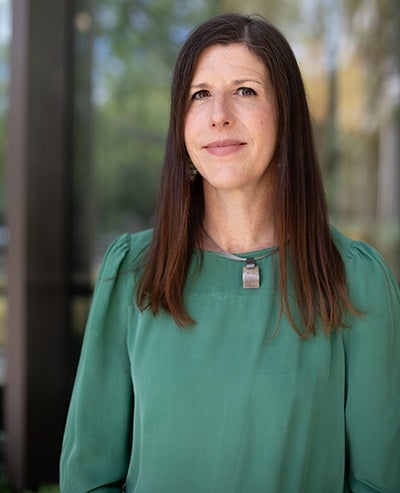
This initial experience moved Sowards to apply for a Fulbright grant in graduate school, allowing her to conduct research in Indonesia in 1999.
“That really led to this lifelong path in Indonesia,” said Sowards, who has since received multiple Fulbright grants that supported her studies abroad. Sowards and her longstanding interest in Indonesia continues unabated, this year with yet another education abroad program she is leading in partnership with Gadjah Mada University, titled “Intercultural and Environmental Communication.”
Exploring Culture and Environment in Indonesia
Set for Summer 2024 in Jakarta, Yogyakarta and a national park in Bali — along with major cultural and religious locations on the islands of Java and Bali — this study abroad program focuses on intercultural communication experiences and also takes an in-depth look at environmental matters in this hotspot of biodiversity.
Students will explore Indonesia, the fourth most populous country in the world, which offers a rich array of cultures, languages and ecosystems that students will experience through daily interactions with Indonesian students, faculty and community members.
“We have field trips to the Borobudur Temple, which is one of the oldest Buddhist temples in Indonesia and an UNESCO World Heritage Site,” Sowards said. “Then we are going to the Prambanan Temple. At the end, we have a field trip to West Bali National Park, and that’s a really interesting national park because it has both a marine ecosystem and a forest habitat.”
Sowards added, “I’m hoping the students will learn about Islam and different aspects of religion. We also have a couple of days [scheduled] in Bali so that students can understand this totally different part of Indonesia, which is more Hindu-based in terms of religion and culture.”
Sowards credits two factors for pushing the program along: A Texas Global Faculty Travel Planning Grant and her doctoral student Dewi Azizah, who is from Indonesia.
In November 2022, the pair traveled to Indonesia to meet with some of Azizah’s former professors to discuss a potential study abroad partnership with Gadjah Mada University, where she attended as an undergraduate.
“She’s been a big part of the planning for this program with Gadjah Mada University, which is one of the best universities in Indonesia,” Sowards said of Azizah. “It’s centrally located and is the heart of Indonesian culture. We’re thinking it will be a great place for UT Austin students.”
Making a Career of Studying Abroad
When she arrived at college, Sowards initially thought she wanted to be a high school teacher in math or Spanish, compelling her to earn a bachelor’s degree in mathematics with a minor in Mexican Studies.
Before her numerous education abroad experiences, it was Sowards’ college roommate who first applied for a study abroad program in Mexico. When her roommate said, “You should come, too!” Sowards replied, “Oh no, I can’t afford to do that, it’s too expensive.”
“My roommate told me, ‘Well, actually it’s cheaper than a regular semester due to the cost of living, and scholarships can cover expenses like airfare and other parts of the program,’ ” Sowards said. “So, I applied for the scholarship and realized, ‘Oh, I guess I can do this.’ ”
This realization is one Sowards wants to share with current UT students, pointing out that studying abroad isn’t as out of reach as it can seem, especially considering the number of available scholarships. Such supportive resources helped send Sowards to Mexico, and Fulbright grants later sent her to Indonesia on two different occasions.
After conducting doctoral research in Indonesia for her dissertation in 2000-2001, Sowards returned in 2005, this time for a 10-week summer program studying the Indonesian language in North Sulawesi, thanks to a Fulbright Hays grant.
As a professor, Sowards started sharing her passion for Indonesia with her students. She started in 2002 by taking students to Indonesia, which then blossomed into trips to Costa Rica, Germany and Mexico, as well. Starting in 2009 and lasting until 2014 — during Sowards’ time teaching at The University of Texas at El Paso (UTEP) — she also offered classes to Indonesian graduate students.
“During that time, because of these frequent trips, I even brought UTEP students to Indonesia during winter break to meet with our partners out there,” Sowards said. “As a professor, I think because I really valued those experiences so much as part of my undergraduate and graduate education, I wanted to provide those opportunities for students.”
She added, “I was always thinking about how students can get involved with field research or the research work that I was doing. It just became part of my career path.”
Expanding Horizons with Personal Encounters
In describing the value of studying abroad, Sowards explains that personally connecting with people, communities and cultures around the world is what stays with you for the rest of your life.
“You can read and read and read, and still, you are always surprised when you actually encounter these experiences in real life,” Sowards said. “It's just a different experience that you cannot get from studying, watching videos or reading books or articles.”
She added, “Having these experiences when you’re a young adult can be so formative for the rest of your life, and I would use myself as an example of that. I really encourage any college students to take advantage of a study abroad program because it leaves such a profound influence and life-changing impact, both personally and professionally.”
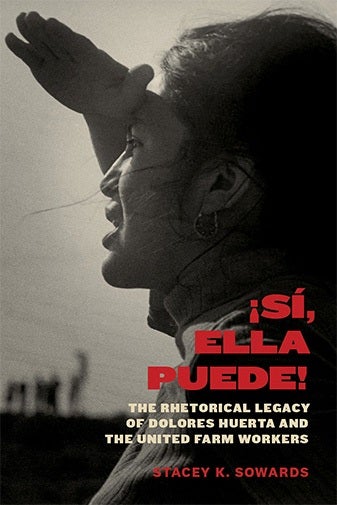
Sowards serves on the Fulbright faculty committee in the fall and was recently part of UT Austin’s largest international delegation at La Feria Internacional del Libros de las Universitarias y los Universitarios (FILUNI), an international book festival and conference.
There, she presented her book, titled ¡Sí, Ella Puede!, which dives into the rhetorical legacy of the United Farm Workers and Dolores Huerta, the fervent leader, organizer and champion of the Latinx community in the struggle for farmworkers’ rights.
Earlier in 2023, Sowards was also awarded the Outstanding Service-Learning Instructor Award at the 2023 UT Tower Awards. The award recognized Sowards for her work teaching a course titled “Decolonizing Communication Studies,” which involved volunteer work at Casa Marianella, a shelter that offers temporary housing and services to refugees seeking asylum in the United States.
Sowards and a group of 12-15 students will depart for Indonesia this summer on June 20 and return July 13. She teaches courses in communication theory, rhetorical theory, environmental communication, gender and communication, and intercultural communication. Her research focuses on environmental, intercultural, and gender and communication studies in Latin America, Southeast Asia and the U.S.

